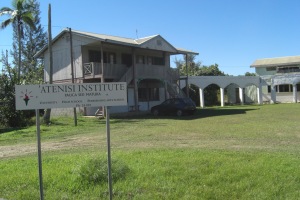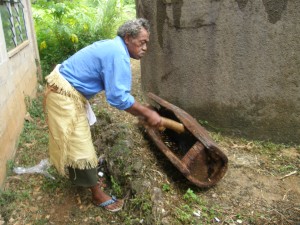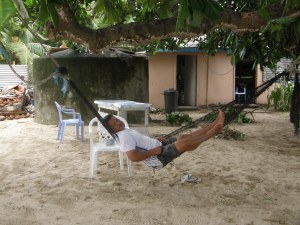In 2010/11 I was lucky enough to take part in an Australian Youth Ambassadors for Development volunteer program in Tonga. I had a wonderful time there and met an amazing variety of people. Whilst on assignment I decided to take Tongan language lessons. Learning this Polynesian language taught me far more about the English language than I’d ever learnt in school (let’s brush aside the fact that I scored less than 50% in HSC English…). But what I really loved about learning Tongan (aside from using the prefix “faka” in just about every sentence), was that the language provided a whole new insight into the Tongan culture.
I am certainly no expert in the Tongan language, so if there are any native speakers out there, I’d love for you to jump in here and correct me on any mistakes I might make.
At first glance, Tongan is a relatively simple language, comprising of only 16 letters and being phonetic. i.e. the words sound exactly how they’re spelled. This simplicity, however, leads to a beautifully complex language where words are often made up from smaller components.
For example, “Malo e lelei” the Tongan greeting, would be the equivalent of “Hello” in English. The actual break down of “Malo e lelei” would be “Thank you for being well”. The prefix “faka” has no English translation, but the closest would be “like”. For example, a meeting or gathering is “fakataha” – “like one” – many people coming together to be one. One of my favourites “fakasuva” – “like a Fijian” meant lazy (there is a deep running rivalry between Tonga and Fiji, thankfully, mostly in jest).

Fakasuva? or just making the most of the fact that you caught this ferry at 4 am and you’re onboard for the next nine hours …
One of the most intriguing insights into Tongan culture for me though was that almost all words referring to time were derived from English words. Anyone who has travelled to an island nation is most likely aware of “island time”. It is often misused as an excuse for something being late. It means that something will happen when it happens. Personally, I love the concept, but it’s difficult to implement in a western society where time is so important us.
But back to the Tongan language. “Time” translates to “Taimi”. The days of the week are:
Monday – Monite
Tuesday – Tusite
Wednesday – Pulelulu
Thursday – Tu’apulelulu – “at the back of Wednesday”
Friday – Falaite
Saturday – Tokonaki – I think this meant gathering food for the Sunday feast?
Sunday – Sapate – “Sabbath”
The months of the year are:
January – Sanuali (There is no “j” in the Tongan alphabet, it’s usually replased with an “s”)
February – Fepueli
March – Ma’asi
April – Epeleli
May – Me
June – Sune
July – Siulai
August – ‘Aokosi
September – Sepitema
October – Okatopa
November – Novema
December – Tisema
I find this interesting because, to me, it seems to indicate that in Tonga, there wasn’t much of a concept of marking the passage of time until Europeans arrived. Even nowadays, time almost feels like something that has been imposed on Tonga by the encroaching influence of the western world. Ferry schedules and flight schedules are common place these days of course, but try calling a 10 am meeting. People will begin to trickle in around 10:23 and continue to arrive up until well, basically whenever they arrive.
It was something that I found challenging when I first arrived in Tonga, but as time passed by, I embraced it and I grew to love it. Now I really miss it. Some people may think that it’s “fakasuva”. I think that it’s actually a lovely way to live life. To just relax about time and let things happen when they happen.




What a lovely, thoughtful post Matini! I previously never thought about the fact that Tongan taimi words are English derivatives. I also had forgotten about fakasuva! Haha! ‘Oku ou misi koe lahi! PS I sent your blog to my brother. I really think you’d get along well.
Malo ‘aupito Sulia!
I really enjoyed writing this piece. It brought back a lot of happy memories 🙂 Feel free to distribute my blog to anyone! I’m looking forward to meeting your brother one day 🙂
Ofa ‘atu!
Some similarities to Madagascar 🙂 will be fun to discuss in oh, three days!!!
Awesome! Can’t wait to hear all about Madagascar!
I am by no means an expert in the language.. but Just an fyi.. fakasuva has a secondary meaning. It is often used in reference to fornication or adultery…basically when 2 un-wed people are living together.
I totally appreciate your insight to taimi.
Haha! I never came across that context. Or maybe I did and didn’t realise it… Thanks for the insight! Malo ‘aupito!